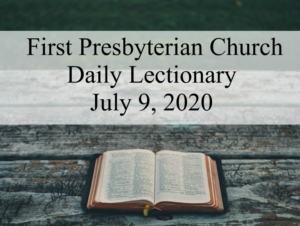
First Reading Deuteronomy 3:18-28
Gospel Reading Matthew 24:1-14
Matthew 24:1-14
1As Jesus came out of the temple and was going away, his disciples came to point out to him the buildings of the temple. 2Then he asked them, “You see all these, do you not? Truly I tell you, not one stone will be left here upon another; all will be thrown down.”
3When he was sitting on the Mount of Olives, the disciples came to him privately, saying, “Tell us, when will this be, and what will be the sign of your coming and of the end of the age?” 4Jesus answered them, “Beware that no one leads you astray. 5For many will come in my name, saying, ‘I am the Messiah!’ and they will lead many astray. 6And you will hear of wars and rumors of wars; see that you are not alarmed; for this must take place, but the end is not yet. 7For nation will rise against nation, and kingdom against kingdom, and there will be famines and earthquakes in various places: 8all this is but the beginning of the birthpangs.
9“Then they will hand you over to be tortured and will put you to death, and you will be hated by all nations because of my name. 10Then many will fall away, and they will betray one another and hate one another. 11And many false prophets will arise and lead many astray. 12And because of the increase of lawlessness, the love of many will grow cold. 13But the one who endures to the end will be saved. 14And this good news of the kingdom will be proclaimed throughout the world, as a testimony to all the nations; and then the end will come.
Maybe we can be forgiven for looking for signs of the end. We have a pandemic; social unrest; economic pain; and a deteriorating political order. Last week came news from China that a swine flu variant of pandemic potential has been found. This week, buried farther down the news, came a story of a reported case of bubonic plague, also in China. (For what it’s worth, plague, even though it killed from one-third to one-half of Europe in the fourteenth century is treatable by antibiotics. But the symbolism is quite apt because: 1) Europeans thought it was the end of the world; and 2) we might be tempted to borrow the symbolism, even without the historic horror to accompany it.) Jesus’ disciples are always worried about this sort of thing. Jesus is going to leave them and Jesus leaves them with a none-too-pleasant vision of what the “end of the age” looks like: wars and rumors of war, false prophets, division, rejection, and death. The litany looks rather different from ours; but maybe we can remember the example of the disciples—that our faith isn’t meant for times when everything is working. (In fact, why should things “work” for us in the world when there is so much wrong and injustice?) Our faith is meant for times like these, that we can remember to proclaim Good News greater than any current struggle, a testimony to all: that despite the problems of the day, it all belongs to God. The one who endures to the end will be saved.
God, we thank you for your gift of Good News that comforts and encourages us, that sends us out into the world as a testament of hope. Be with us in our living and in our sharing your Word, that our endurance would produce the hope that doesn’t disappoint, but realizes your salvation, in the life of Jesus, your Son. Amen.
